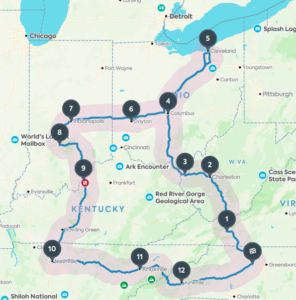By Gary Gunderson
We’re in road trip mode again, this time in a Mini Cooper.
It was a year ago that a few of us drove a Winnebago from San Diego to Wilmington, North Carolina, on behalf of Stakeholder Health and 100 Million Healthier Lives, following a hunch that everything we were hoping for is already happening. We should turn our attention from trying to start things, to the more grown-up humble work of nurturing the life breaking out in all the communities you’d least expect it: East San Diego, San Bernardino, El Paso, Lubbock, Memphis, the Delta, Wilmington and of course our little town of Winston-Salem.
It turns out that, even in our hard-hearted times—maybe because of them—people in every town large enough to imagine a Starbucks is hard at work finding their local way to give the next generation a chance. They aren’t waiting for the hospital or university to notice (although sometimes they are involved). And they aren’t waiting for national foundations or networks to notice and help (although they are glad to take it). The human experiment would have never made it out of Africa if it had to wait for hospitals and foundations to be invented. Many of us feel as if we are in a more fraught point in the Experiment of Life, what with the apparent collapse of the capacity of humans to talk to each other, much less the soon-to-be-missing ice caps. But maybe even now, we are finding our way community by community.
On this week’s road trip we’ll be travel just below what the First People called the Inland Sea. Huntington, West Virginia, on the Ohio River (from the Iroquois word, “O-Y-O,” meaning “the great river”). Cleveland on the banks of the sea, then across to Dayton, Indianapolis and Bloomington before turning south to Nashville and home to Winston-Salem. This land was once covered by dense forests, then farms, then factories and now seeking another way. This is land that knows about violation and desecration; seasons of birth and rebirth, too.
Rules of the road
Although the Winnebago was a mistake, the rules of the road proved worthy: no PowerPoints or microphones, no meetings in a hospital or hotel, never more than 20 people. Listen and dialogue like grown-ups used to do. Last year, the week after the bitter midterm elections, we were surprised at how little people spoke of national anything, much less politics. Everywhere we found unlikely people crossing supposedly toxic boundaries working on long term goals, not just short term “wins” (as the consultants often advise). Grown-ups at work!
Our ears are tuned to how people in really tough towns are finding alignment built for long-term generative goals. Not just preventing this or that troubling phenomenon (opioids being the one currently best funded), but serious about the multiple aspects anything serious must engage. It really doesn’t matter which thread one follows into the web of possibilities. But it does matter to look beyond the local urgent fears to imagine the future. We are listening for how that happens and how it might be sustained.
We work for hospitals, of course, so we have friends among them on this hopeful lap around the sea. We know that hospitals often suck the air, money and attention out of broader civic alignments. But not always. We’re listening for appropriate behavior, the kind humble adults display when they are thinking of their legacy.
Fifty organizations recently gathered in Washington, D.C., about a mile from where the TV cameras will be focused this week. The WINS alliance began as an effort to agree on metrics and indicators pointing beyond our obsession with disease toward wellness. Following one humble-spirited grown up pediatrician, Dr. Soma Stout, the network is staying together for the harder and somewhat endless labor of actually moving the movement. We’ll be surprised if we don’t hear echoes of this turn to wellness, or what we’d call Leading Causes of Life in these tough towns.
We’ll listen for another thing that was surprisingly omitted from the WINS list of positive things, Spirit. We’ve never seen any transformational anything happen without people experiencing their own transformation, too. It doesn’t help to strip out the natural language of spirit to describe this, even though the language may be quaint: lament, repentance, metanoia, grace, mercy, shalom. This is broken ground we travel in these hard-hearted times. We find broken ground much healthier than pavement.
Years ago, before I actually knew much, I wrote Deeply Woven Roots, about the strengths of congregations for the health of the community. A bit to my surprise, this is continuing to find itself relevant, cited by the National Academies of Science and, I hear, an upcoming article in JAMA. Toward the end, I wrote about brokenness: “breaking ground is not the name of a ceremony that launches a building, but the place itself. This is where we come to break, to be broken open. Indeed, it is the reason we come, for through being broken we are made whole. Nothing new happens without breaking the old. This is the pervasive truth of eggs and omelets, wine and wineskins, seeds and gardens, birth and being born again, repentance and forgiveness.”
I’ll be amazed if we don’t hear that on this road trip across the Inland See.
If you’re along this journey path, don’t hesitate to let us know. Might be tight in the Mini Cooper! But we might be able to share some coffee and dialogue along the way.
Here’s a link to the See2See Road Trip

